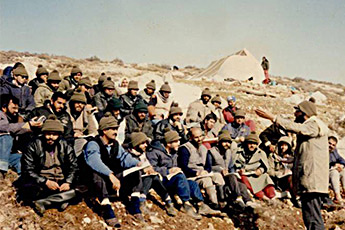Learn about the history of the Palestinian struggle for freedom, equality and justice by exploring major events in the history of their oppression on this day of the year.
17 December
DOGGED PALESTINIAN RESISTANCE DEFEATED ISRAEL On this day in 1992, the Israeli military drove 415 Palestinians at gunpoint across the border into Southern Lebanon. The Palestinians camped out on frozen hills. Israel then defied a UN Security Council condemning the move and calling for their return. The last of the Palestinians re-entered occupied Palestine (to Israeli jails) a year later, a huge moral victory due to their determination not to be expelled from their native land. The move brought worldwide censure to Israel and sympathy for the Palestinians.
On this day in 1992, the Israeli military drove 415 Palestinians at gunpoint across the border into Southern Lebanon. The Palestinians camped out on frozen hills. Israel then defied a UN Security Council condemning the move and calling for their return. The last of the Palestinians re-entered occupied Palestine (to Israeli jails) a year later, a huge moral victory due to their determination not to be expelled from their native land. The move brought worldwide censure to Israel and sympathy for the Palestinians.
اصرار الفلسطينين المبعدين هزم إسرائيل
17 ديسمبر
في مثل هذا اليوم من عام 1992 ، طرد جيش الاحتلال الإسرائيلي 415 فلسطينيا تحت تهديد السلاح عبر الحدود إلى جنوب لبنان. وخيم الفلسطينيون على تلال متجمدة. تحدت إسرائيل مجلس الأمن الدولي الذي أدان هذه الخطوة ودعى إلى عودتهم. عاد آخر الفلسطينيين إلى فلسطين المحتلة (إلى السجون الإسرائيلية) بعد عام ، وهو نصر معنوي ضخم بسبب تصميمهم على رفض الطرد من أرضهم الأصلية. جلبت هذه الخطوة انتقادات عالمية لإسرائيل وتعاطفًا مع الفلسطينيين.
According to Israeli B'Tselem
In the first two weeks of December 1992, six members of the Israeli security forces were killed by Palestinian residents of the Occupied Territories. One of them was a Border Policeman, Nissim Toledano, who was kidnapped on 13 December by Hamas. After finding Toledano's body, Israel arrested some 1,600 Palestinians. On 15 December, Prime Minister Rabin announced that the Israeli government intended to take severe action against Hamas.
The deportees were transported to the Zumriyeh crossing point at the northernmost point of the "security zone". Because the Lebanese army prevented the deportees from continuing north, and because Israel claimed that it was not responsible for the deportees on grounds that the deportees were in territory under Lebanese control, the deportees were left in no-man's land.
Deportation of persons from their homeland is a flagrant violation of human rights. In deporting the Palestinians, Israel unilaterally ignored its obligation to persons under its control. Such a violation cannot be justified in light of the violent acts committed by Palestinians in 1992. It is precisely in "emergency situations" that a state's commitment to human rights is tested. Unfortunately, Israel failed this test in December.
Collective punishment, i.e., the punishment of individuals or groups for actions not specifically attributed to them, is forbidden under Israeli and international law. Article 33 of the Fourth Geneva Convention states that, "No protected person may be punished for an offense he or she has not personally committed. Collective penalties and likewise all measures of intimidation or of terrorism are prohibited.... Reprisals against protected persons and their property are prohibited".
There had not been deportations of Palestinians on anything approaching this scale since the period soon after Israel took control of the West Bank and Gaza Strip in the 1967 Middle East War.
Handed $50 each, along with some food, jackets and blankets, the Palestinians from both the West Bank and Gaza were taken on a wintry night into the "security zone" that Israel has declared in southern Lebanon. They were then to be dropped off at the northern edge of the buffer zone and ordered into territory controlled by Lebanese forces...
Human-rights groups like Amnesty International and some foreign governments, including Britain speaking in behalf of the European Community, had appealed to Israel not to follow through on the ordered expulsions, saying the Fourth Geneva Convention of 1949 prohibits this sort of forced transfer from occupied territories.The State Department said in Washington that the United States "strongly condemns the action of deportation."
Israeli Prime Minister Rabin, architect of an iron-fist policy against Palestinian rioters when he was Defense Minister five years earlier, said he had to act against "an escalation of murderous terrorist activity" by Hamas and another group, Islamic Jihad. To do nothing after the latest fatal attacks on Israelis would have risked making Israel look weak and would have further strengthened Hamas, he argued.
A NYT report two weeks later
For many of the 760,000 Arabs in Israel, the daily news reports showing Palestinians stranded in snow-covered tents in southern Lebanon have ended neutrality. Many Israeli Arabs now support, for the first time, a series of protests inside Israel. "The vigor and determination of the protests by Israeli Arabs in recent days is unprecedented," said Dr. Elie Rekhkess, a specialist on Israeli Arabs at the Dayan Center for Middle Eastern Studies at Tel Aviv University. "The mass deportation touched on one of the most sensitive issues for any Palestinian - the fear, real or imagined, of being deported."
